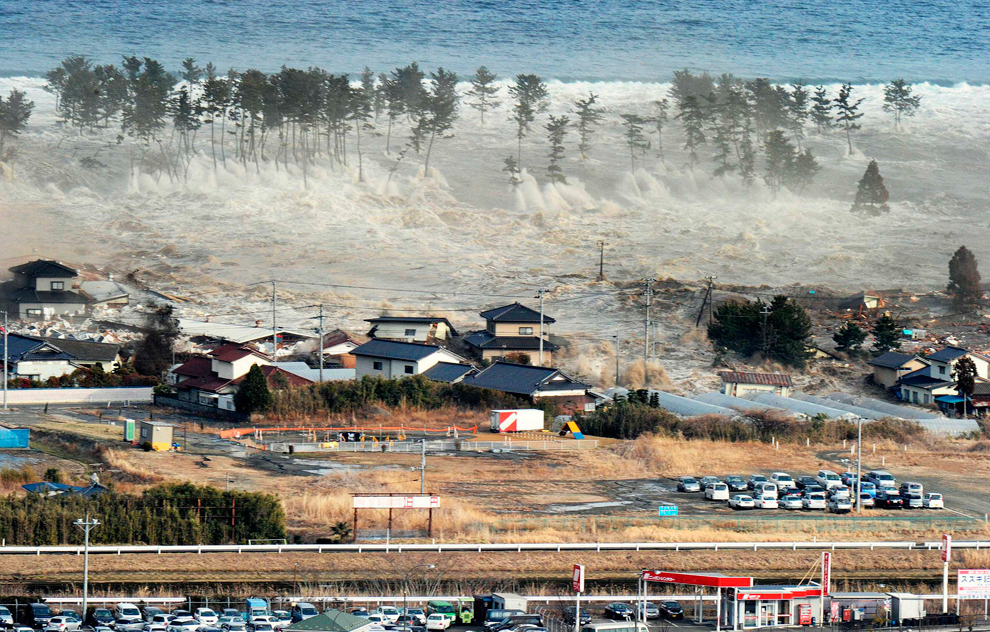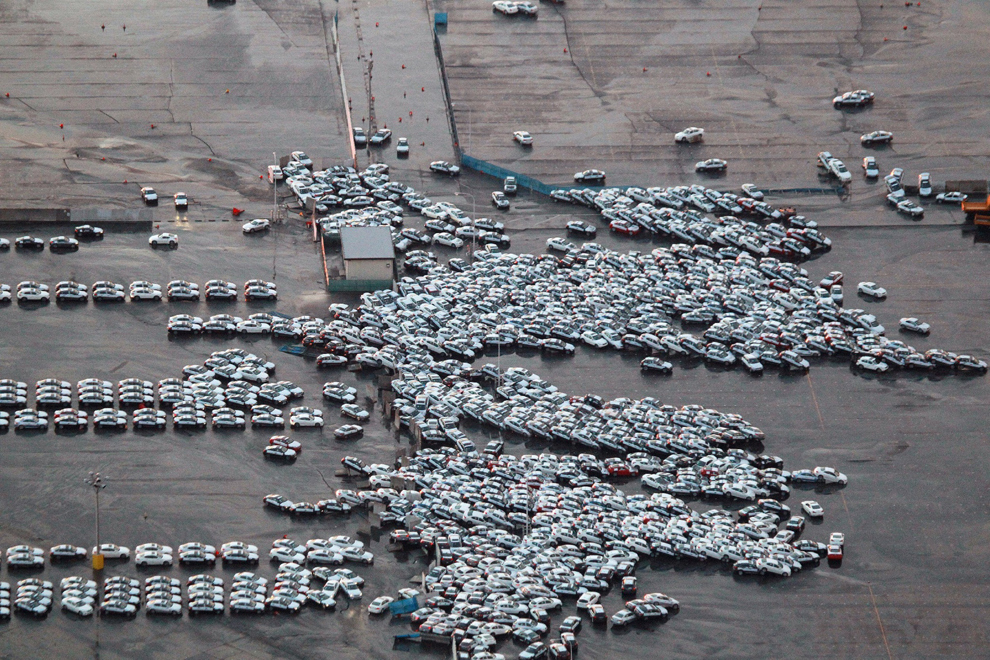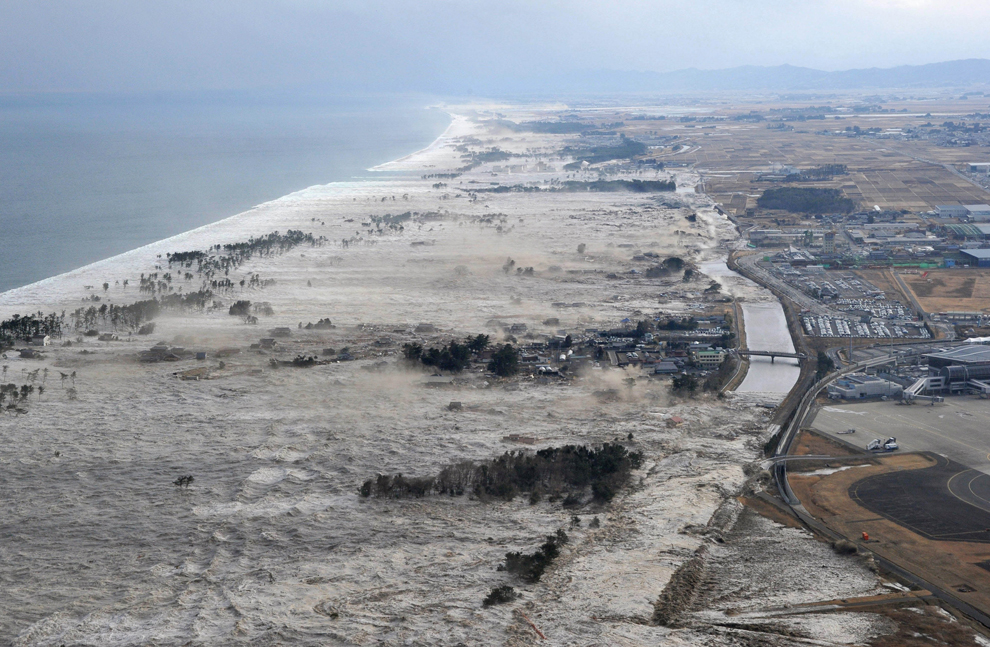An 8.9-magnitude earthquake hit off the east coast of Japan early today. The quake -- one of the largest in recorded history -- triggered a 23-foot tsunami that battered Japan's coast, killing hundreds and sweeping away cars, homes, buildings, and boats. Editors note: we'll post more as the story develops -- Lloyd Young

A tsumani triggered by a powerful earthquake makes its way to sweep part of Sendai airport in northern Japan on Friday March 11, 2011. The magnitude 8.9 earthquake slammed Japan's eastern coast Friday, unleashing a 13-foot (4-meter) tsunami that swept boats, cars, buildings and tons of debris miles inland. (Kyodo News/Associated Press)

Sendai Airport is surrounded by waters in Miyagi prefecture (state), Japan, after a ferocious tsunami spawned by one of the largest earthquakes ever recorded slammed Japan's eastern coast Friday, March 11, 2011. (Kyodo News/Associated Press)

Evacuees stand around Shinjuku Central Park in Tokyo Japan March 11, 2011. A massive 8.9 magnitude quake hit northeast Japan on Friday, causing many injuries, fires and a ten-metre (33-ft) tsunami along parts of the country's coastline. A tsunami warning has been issued for the entire Pacific basin except for the mainland United States and Canada following a huge earthquake that hit Japan on Friday, the Pacific (Reuters)

Light planes and vehicles sit among the debris after they were swept by a tsumani that struck Sendai airport in northern Japan. (Kyodo News/Associated Press)

Houses are swept by a tsunami in Natori City in northeastern Japan March 11, 2011. A massive 8.9 magnitude quake hit northeast Japan on Friday, causing many injuries, fires and a ten-metre (33-ft) tsunami along parts of the country's coastline. There were several strong aftershocks and a warning of a 10-metre tsunami following the quake, which also caused buildings to shake violently in the capital Tokyo. (Reuters)
People take shelter as a ceiling collapses in a bookstore during an earthquake in Sendai, northeastern Japan March 11. (Reuters)

Tsunami swirls near a port in Oarai, Ibaraki Prefecture (state) after Japan was struck by a strong earthquake off its northeastern coast Friday, March 11. (Kyodo News/Associated Press)

Seismologists pose for the media as they display a seismographic graph showing the magnitude of the earthquake in Japan, on a monitor at the British Geological Survey office in Edinburgh, Scotland March 11, 2011. The biggest earthquake on record to hit Japan struck the northeast coast on Friday, triggering a 10-metre tsunami that swept away everything in its path, including houses, ships, cars and farm buildings. (David Moir/Reuters)

An energy map provided by the National Oceanic and Atmospheric Administration (NOAA) shows the intensity of the tsunami caused by the magnitude 8.9 earthquake which struck Japan on March 11, 2011. A tsunami warning has been issued for the entire Pacific basin except mainland United States and Canada following a huge earthquake that hit Japan on Friday, the U.S. Pacific Tsunami Warning Center said. The warning includes Hawaii and extends from Mexico down to South American countries on the Pacific, the center said. (NOAA/Tsunami Warning Center/)

This National Oceanic and Atmospheric Administration (NOAA) Global bathymetry map image released on March 11, 2011 shows features of the ocean floor depth (or bathymetry) from a NOAA ETOPO-1 dataset. The image shows the entire Western Pacific basin. Notice how abruptly the Japanese islands rise out of the ocean. Other coastal Asian areas have much more gradual slopes. The islands and mountain ranges throughout the ocean, visible in this imagery, also affect the tsunami travel time and speed. In the open ocean, tsunamis can travel at speeds up to 500 mph (800 kph). This momentum is what creates such a destructive force as the wave moves inland. Tsunami waves rolled thousands of miles across the Pacific Ocean after a massive earthquake off Japan and washed ashore in Hawaii early March 11, 2011, but the tourist hotspot appeared to escape major damage. As sirens blared and Hawaiian authorities rapidly evacuated low-lying areas, the Pacific Tsunami Warning Center reported wave changes at Waianae Harbor at around 3:24 a.m. (NOAA/handout)
Giant fireballs rise from a burning oil refinery in Ichihara, Chiba Prefecture (state) after Japan was struck by a strong earthquake off its northeastern coast. (Kyodo News/Associated Press)

An oncoming tsunami strikes the coast in Natori City, Miyagi Prefecture, northeastern Japan March 11, 2011. The biggest earthquake to hit Japan in 140 years struck the northeast coast on Friday, triggering a 10-metre tsunami that swept away everything in its path, including houses, cars and farm buildings on fire. (Reuters)

Fishing boats and vehicles are carried by a tsunami wave at Onahama port in Iwaki city, in Fukushima prefecture, northern Japan. (Fukushima Minpo/AFP/Getty Images)

A tsunami, tidal wave smashes vehicles and houses at Kesennuma city in Miyagi prefecture, northern Japan. (AFP/Getty Images)

Japan's Prime Minister Naoto Kan (center) reacts he he feels an earthquake as he attends a committee meeting in the upper house of parliament in Tokyo March 11. A massive 8.8 magnitude quake hit the northeast coast of Japan on Friday, shaking buildings in the capital Tokyo, causing "many injuries", at least one fire and triggering a four-metre (13-ft) tsunami, NHK television and witnesses reported. (Toro Hanai/Reuters)

The owner of a ceramic shop checks his damaged wares following the massive 8.9-magnitude earthquake in Tokyo. (Yoshikazu Tsuno AFP/Getty Images)

Rescue workers hurry to a building following reports of injuries in Tokyo's financial district after an earthquake hit off the coast of northern Japan. There were several strong aftershocks and a warning of a 10-metre tsunami following the quake, which also caused buildings to shake violently in the capital Tokyo. (Kim Kyung-Hoon/Reuters)

An aerial shot shows vehicles ready for shipping being carried by a tsunami tidal wave at Hitachinaka city in Ibaraki prefecture on March 11, 2011. A massive 8.8-magnitude earthquake shook Japan, unleashing a powerful tsunami that sent ships crashing into the shore and carried cars through the streets of coastal towns. (AFP/Getty Images)

This aerial shot shows the tsunami tidal waves moving upstream (left side) in the Naka river at Hitachinaka city in Ibaraki prefecture on March 11. (AFP/Getty Images)

Houses, cars and other debris are washed away by tsunami tidal waves in Kesennuma in Miyagi Prefecture, northern Japan, after strong earthquakes hit the area Friday, March 11. (Keichi Nakane/Associated Press/The Yomiuri Shimbun)

Stranded commuters wrap themselves in blankets bracing for chilly evening at a park in Yokohama, near Tokyo, following a strong earthquake hit eastern Japan on Friday, March 11. (Shuji Kajiyama/Associated Press)

A woman checks a map to find a route as she takes a rest at a hotel lobby after subway and train services were suspended after an earthquake, in Tokyo. (Kim Kyung-Hoon/Reuters)

Evacuees wait in an evacuation area following an earthquake in Tokyo, Japan, on Friday, March 11, 2011. Japan was struck by its strongest earthquake on record, an 8.9-magnitude temblor that shook buildings across Tokyo and unleashed a seven-meter-high tsunami that killed hundreds as it engulfed towns on the northern coast. (Haruyoshi Yamaguchi/Bloomberg)

A man looks for supplies in a store in Tokyo that has almost sold out of food and drink as people are unable to return home after an earthquake March 11. (Yuriko Nakao/Reuters)

Hotel employees squat down in horror at the hotel's entrance in Tokyo after a strong earthquake hit Japan. (Itsuo Inouye/Associated Press)

Stranded commuters watch a TV news on a powerful earthquake at Tokyo railway station as train services are suspended in Tokyo. (Hiro Komae/Associated Press)

Residents check the damage done on a road and house in Sukagawa city, Fukushima prefecture, in northern Japan. (Fukushima Minpo/AFP/Getty Images)

Workers inspect a caved-in section of a prefectural road in Satte, Saitama Prefecture, after one of the largest earthquakes ever recorded in Japan slammed its eastern coast March 11. (Saitama Shimbun/Associated Press/Kyodo News)

A station staff directs passengers at Tokyo's Shinagawa train station after a magnitude 8.9 earthquake slammed Japan's eastern coast. (Hiro Komae/Associated Press)
 Police place roadside flares along the highway on March 11 in Honolulu, Hawaii. An earthquake measuring 8.9 on the Richter scale has hit the northeast coast of Japan causing tsunami alerts throughout the Pacific Ocean. Thousands along the coast are evacuating their homes in Hawaii as the state prepares for tsunami waves. (Lucy Pemoni/Getty Images)
Police place roadside flares along the highway on March 11 in Honolulu, Hawaii. An earthquake measuring 8.9 on the Richter scale has hit the northeast coast of Japan causing tsunami alerts throughout the Pacific Ocean. Thousands along the coast are evacuating their homes in Hawaii as the state prepares for tsunami waves. (Lucy Pemoni/Getty Images) 
Puipui Faletoi, of Moiliili, Oahu, background center, rests in his vehicle with his sons Daniel, left, and Fletcher Faletoi in the parking lot of Manoa District Park in Oahu, Hawaii. The site is a volunteer staging area which could turn into a Red Cross shelter if a tsunami arrives. The Faletoi family plan to take shelter here. (Rebecca Breyer/Associated Press)

Students hold candles as they pray for Japan's earthquake victims inside their school in the western Indian city of Ahmedabad March 11. (Amit Dave/Reuters)

A pedestrian road collapsed in the massive 8.9-magnitude earthquake in Urayasu city, Chiba prefecture on March 11. (Toshifumi Kitamura/AFP/Getty Images) #

A man sits wrapped in a blanket after he was evacuated from a building in Tokyo's financial district, after an earthquake off the coast of northern Japan, March 11. (Kim Kyung-Hoon/Reuters) #
 Shores are submerged in Natori city, Miyagi prefecture (state), Japan, after a ferocious tsunami spawned by one of the largest earthquakes ever recorded, slammed Japan's eastern coasts Friday, March 11, 2011. (Kyodo News) #
Shores are submerged in Natori city, Miyagi prefecture (state), Japan, after a ferocious tsunami spawned by one of the largest earthquakes ever recorded, slammed Japan's eastern coasts Friday, March 11, 2011. (Kyodo News) #Vehicles are crushed by a collapsed wall at a carpark in Mito city in Ibaraki prefecture on March 11. (Jiji Press/AFP/Getty Images) #

Residents walk through the rubles of residents collapsed by a powerful earthquake in Iwaki, Fukushima prefecture Japan. (Kyodo News/Associated Press) #

This National Oceanic and Atmospheric Administration (NOAA) image released on March 11, 2011 shows model runs from the Center for Tsunami Research at the NOAA Pacific Marine Environmental Laboratory showing the expected wave heights of the tsunami as it travels across the Pacific basin. The largest wave heights are expected near the earthquake epicenter off Japan. The wave will decrease in height as it travels across the deep Pacific but grow taller as it nears coastal areas. In general, as the energy of the wave decreases with distance, the near shore heights will also decrease (e.g., coastal Hawaii will not expect heights of that encountered in coastal Japan). Tsunami waves rolled thousands of miles across the Pacific Ocean after a massive earthquake off Japan and washed ashore in Hawaii early March 11. (NOAA)

Buildings burn in Yamada town, Iwate prefecture (state) after Japan's biggest recorded earthquake hit March 11. (Associated Press/The Yomiuri Shimbun)










Δεν υπάρχουν σχόλια:
Δημοσίευση σχολίου